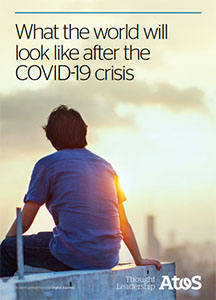Collective intelligence — a key differentiator for organizations in the post-COVID era
The resilience of every organization on the planet is being tested in every possible way by the sheer scale and ferocity of the unfolding COVID pandemic. In particular, it is impacting the ability of teams to share and reuse knowledge as well as their ability to collaborate and learn from each other. Collective intelligence is the answer. Below you’ll find an actionable framework for assessing an organization’s ability to move forward — together.
What has fundamentally changed?
Humans have traditionally been more comfortable and efficient in sharing experiences and knowledge through face-to-face interactions — especially informal ones. Furthermore, as empirically proven in many studies, tacit knowledge and experiential insights are more likely to be exchanged when there is a high degree of trust. However, physical meetings have reduced to a minimum in the ‘new normal’ world, so the chances of such interactions have largely reduced. This situation is severely affecting organic knowledge-sharing among the workforce. The situation calls for special efforts to ensure that ‘real’ business-centric knowledge gets diffused swiftly across the organization. Otherwise, the lack of it will cripple operational performance as an invisible dark force.
The COVID situation calls for special efforts to ensure that ‘real’ business-centric knowledge gets diffused swiftly across the organization. Otherwise, the lack of it will cripple operational performance as an invisible dark force.
Post-COVID, there is a much bigger role for knowledge management in the organizations than previously. Now that practices like ‘stand and shout from the cubicle’ or ‘chance meetings’ have significantly reduced, it is critical to assist employees in their knowledge discovery, validation, consumption and application processes.
An actionable framework for collective intelligence
Every organization can use the following framework to assess its current vulnerability, impact and adaptive capacity to design or adjust its ongoing collective intelligence approaches. The framework is based on a simple equation:
Vulnerability = Impact - Adaptative Capacity

The organizational vulnerability related to knowledge-sharing and collaboration during and after COVID equals the impact on organizational performance minus the adaptive capacity of the organization i.e., the current readiness of the organization to facilitate smooth functioning of knowledge networks. The above diagram describes it in detail.
Two steps for effective diagnosis
Step 1. Assess vulnerability — which is a combination of risk/exposure and sensitivity:
- How much does remote working affect the ability of your teams to share and reuse knowledge?
- Does your organization provide adequate collective intelligence infrastructure (i.e., processes, policies, communities, tooling, etc.) to stay connected and share knowledge seamlessly?
- How many of your business and support processes are fully digitally ready to ensure business continuity with a remote workforce? How many still depend, even if partially, on non-digital means (paper)?
- What is the state of maturity of knowledge networks in your enterprise?
- Are your experts visible to the larger workforce through your collaborative platforms?
- What fraction of searches fail to provide the desired output?
- How effective has the eLearning process been in your enterprise? What fraction of ‘first timer’ employees are signing up into the learning management systems?1
Step 2. Identify pressing needs and business impact. Read the tell-tale signs that your employees need help in knowledge-sharing and collaboration! It also will help assess the business impact on your overall organizational performance.
- Is there an increase in search queries on enterprise search? Is there an increase in failed searches?
- Is there a sudden increase in enterprise social network (ESN) activities? Is community enrolment up?
- Are your experts experiencing a larger influx of queries?
- How many new visitors are signing into the learning management systems?
You can derive very clear messages from the analysis of the above indicators about what is needed, who needs help, and when and where help is being sought by teams.
Improve adaptive capacity: digitalization is not enough
Most organizations were caught unprepared by the abrupt changes of the COVID emergency. Their adaptive capacity (readiness) was in most cases far below adequate levels. The immediate rush was to ensure business continuity with all sorts of measures, mostly ad hoc. As the dust begins to settle, organizations start to realize the need for rapid digitalization of their core business processes. This would enable knowledge-sharing and collaboration to some extent, but not enough. It must be complemented by building and nurturing knowledge networks to help employees meet their knowledge needs.
The best approach to collective intelligence I’ve seen, through our work at Atos, focuses on building powerful knowledge networks that combine:
- Knowledge platforms
- Communities
- Highly engaged experts
- Proactive learning frameworks
- Advanced technologies
The Atos approach is highly convenient for knowledge seekers to fulfil their knowledge and collaboration needs and help achieve their business purposes efficiently.
Collective intelligence is going to be an invisible but dominant game-changer for organizations in the new normal.
1According to a global study conducted by LinkedIn, on average, employees are spending 130% more time on learning in the post-COVID scenario.
By Manish Saxena, Group Head – Knowledge Management
Posted on August 20
Topics
Expert Insights
Digital Transformation
Data and AI – Knowledge
Workplace
Scientific Community
Digital Vision


